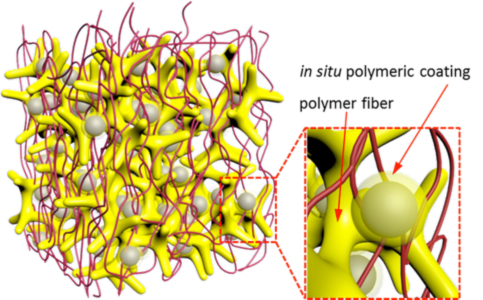A new ternary electrode made from nanostructured silicon nanoparticles, conducting polymer hydrogel and carbon nanotubes developed by researchers at the University of Texas at Austin in the US might be ideal as an ultrahigh performance lithium-ion battery anode material. The electrode, which can be made using scalable solution-phase synthesis and industrially compatible slurry coating techniques, has outstanding performance – with a reversible discharge capacity of more than 1600 mAh/g over 1000 cycles at a current rate of 3.3 A/g.

The nanostructured silicon nanoparticles/conducting polymer hydrogel/carbon nanotube (Si/PPy/CNT) electrode was prepared using an all-solution phase synthesis technique. The researchers, led by Guihua Yu, mixed an aqueous solution comprising a conductive polymer monomer and the cross-linker phytic acid with a second solution containing an initiator molecule, ammonium persulphate. Commercially available silicon nanoparticles and carbon nanotubes were then added to the mix.
The initiator kick starts the polymerization reaction, forming a coating on the silicon surface and a 3D hydrogel network. After 10 minutes reaction time, the final slurry was ready to be coated onto a copper current collector for making anodes.
Silicon is an excellent and cheap material for use in lithium-ion battery anodes because it has a theoretical capacity of 4200 mAh/g – a value that is ten times better than the current technology relying on graphite anodes. However, there is a problem in that silicon expands and contracts by as much as 400% in volume during battery charge/discharge and so easily breaks, which results in a very limited cycle life.
3D conductive porous matrix
The new electrode structure design developed by Yu team overcomes this problem because it provides a 3D conductive porous matrix into which the silicon can expand. What is more, the 20 nm thick polymer formed on the silicon nanoparticles in the slurry makes the finished electrode material more stable.
"The silicon/conducting polymer hydrogel is reasonably stable in itself, but when we add a small amount of carbon nanotubes to this binary composite, the batterys performance improves even further, and it has a better capacity and cyclability," explains Yu. "These improvements come thanks to the fact that carbon nanotubes are extremely good electrical conductors. They wrap around the silicon particles and the polypyrrole fibres in the slurry and strengthen the mechanical properties of the composite electrode."
And that is not all: the all-solution based technique to synthesise the electrode is compatible with existing battery manufacturing technology, says Yu, something that could potentially allow the devices to be made on a large scale. Such electrodes could be used in next-generation lithium-ion batteries that would have a much higher energy storage density and longer cycle life, which is important when it comes to addressing the ever-increasing energy storage needs of hungry portable electronics and electric vehicles, he adds.
Making other high-capacity anode materials
"Our electrode design might also be used to make other alloy-type high-capacity anode materials, such as germanium, tin and tin oxides," he told nanotechweb.org, "and this novel concept might even be potentially applied to make a variety of other electrochemical devices, such as supercapacitors and biosensors."
The team says that it will now be studying the electrochemical properties of its novel ternary electrode in more detail to better understand the interface between the soft polymers and the hard inorganic silicon particles. "In fact, we will be working with colleagues from other labs to observe how the electrochemical interface evolves in real time during the battery charge-discharge process," said Yu.

